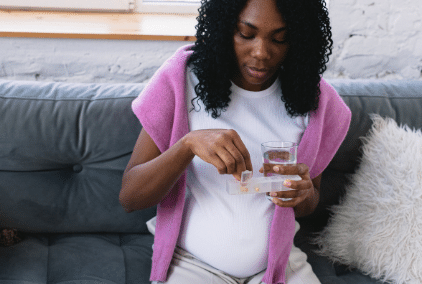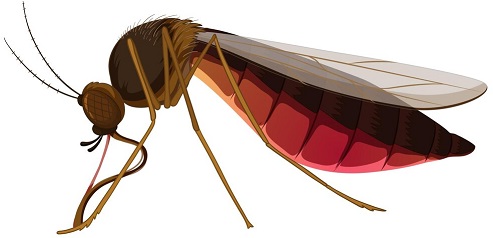
![]() Blessing AmakaMaternal and Neonatal CareAugust 29, 2024
Blessing AmakaMaternal and Neonatal CareAugust 29, 2024
During pregnancy, the immune response of the mother is reduced. This makes most illnesses and infections, like malaria, pose a serious threat to both the expectant mother and her unborn baby. In this article, we explore the first-line treatment of malaria in the first trimester of pregnancy.

In pregnant women, malaria is associated with severe risks of maternal and prenatal complications and mortality. This is true especially during the first trimester, which is the critical period of pregnancy when the complications of the infection are more likely to affect the development of the baby.
Although there are many antimalarial drugs that can be taken to treat malaria, not all of them are recommended to be taken during pregnancy, as some of them can be harmful to the fetus. In this article, we will discuss the malaria treatment options that are safe in the first trimester of pregnancy.

Malaria is a parasitic infection caused by the parasite plasmodium. The parasite lives in female Anopheles mosquitoes and is transmitted through their saliva while feeding on human blood.
The symptoms of malaria include fever, headache, nausea, vomiting, and myalgia. These symptoms usually appear 7 to 30 days after mosquito bites.
Malaria infection during pregnancy exposes the expectant mother to a higher risk of:
It can also lead to:

According to a 2000 study published in the British Medical Journal, pregnant women are twice as attractive to malaria-carrying mosquitoes as non-pregnant women. This finding and the severity of the consequences make the prevention of malaria in pregnancy very important. Some of the ways to prevent malaria are:
2. The use of preventive care: antimalarial medication usually sulfadoxine-pyrimethamine (SP-IPTp) popularly known as fansidar is given to pregnant women at particular intervals, whether the woman is infected or not to protect the woman and the unborn baby from malaria infection.
However, since this medication is an antifolate, its use is contraindicated in the first trimester, as it can reduce the level of folic acid in the body, resulting in neural tube defects. So this preventive treatment is only available for pregnant women in their second and third.

Over 60% of malaria infections in pregnancy are estimated to occur in the first trimester (first 3 months). This means, pregnant women are at higher risk of malaria infection during the first trimester and no protective therapies are available for them at this stage. So, the only option to prevent malaria in the first trimester is to avoid mosquito bites.
The guidelines for treating malaria by the World Health Organization (WHO) recommend artemisinin-based combination therapy (ACT) as the first course of treatment for malaria in almost all individuals; this includes pregnant women in their second and third trimesters.
For malaria treatment in the first trimester, the options were limited to quinine alone or in combination with clindamycin. Although considered safe at a time, these options compared to ACT are not always readily available, not that effective in treating malaria, and they are less tolerated. Most importantly, the long and complex regime of taking quinine twice a day for 7 days makes it more difficult for most patients to adhere to.
The treatment option for malaria was however recently updated by WHO 2022 guidelines, which now recommends the combination of artemether and lumefantrine as a first-line treatment for malaria in the first trimester.
Other ACTs (artesunate-amodiaquine, artesunate-mefloquine, and dihydroartemisinin-piperaquine) are not recommended as there are not enough studies and evidence that reveals that they are safe for treating malaria in the first trimester. However, these other ACTs may be considered for use where artemether-lumefantrine is not available and the life of the woman is in danger.
Treating malaria during the first trimester can be safe and can help to prevent complications. However, the safety of the treatment depends on the type of medication used. It is important to consult a doctor to prescribe the best medication for you.
No, treatment of malaria in the first trimester should not be delayed, as delaying treatment can worsen the severity and complication of the infection. It is important to seek immediate medical attention if one suspects malaria in their first trimester, as early diagnosis and treatment can improve the health of both the mother and the baby.
Seek immediate medical attention. Describe your symptoms to your doctor and also inform your doctor that you are pregnant. This will guide your doctor on how to treat you if a test confirms that you have malaria.
Your doctor will carry out a test to confirm if you are infected with malaria and prescribe a treatment option based on the severity of the infection and the stage of the pregnancy.
To reduce or prevent the severe complications and risk associated with malaria infection in the first trimester of pregnancy, it is important for expectant mothers who suspect that they might be infected to consult a doctor immediately for a proper diagnosis and personalized treatment plan.
Khalid A. J. Al Khaja and Reginald P. Sequeira, (2021). Drug treatment and prevention of malaria in pregnancy: a critical review of the guidelines
Center of Disease Control and Prevention (CDC), (2024). https://www.cdc.gov/malaria/hcp/clinical-guidance/pregnant-women.html#toc
Center of Disease Control and Prevention (CDC), (2018). Updated CDC Recommendations for Using Artemether-Lumefantrine for the Treatment of Uncomplicated Malaria in Pregnant Women in the United States
World Health Organization(WHO), (2024). Safety of artemisinin and non-artemisinin antimalarials in the first trimester of pregnancy
World Health Organization(WHO), (2023). WHO Guidelines for malaria
Roger Dobson, (2000). Mosquitoes prefer pregnant women
healthcareAugust 20, 2025
healthcareSeptember 10, 2025








